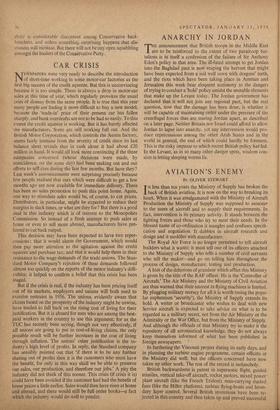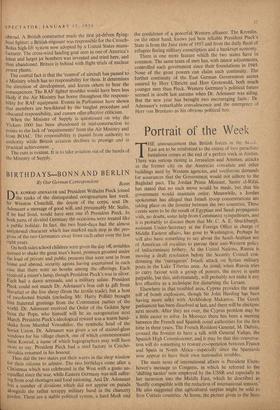AVIATION'S ENEMY
By OLIVER STEWART N less than ten years the Ministry of Supply has broken the I back of British aviation. It is now on the way to breaking its heart. When it was amalgamated with the Ministry of Aircraft Production the Ministry of Supply was supposed to minister to the users of aircraft and to supply their requirements. In fact, intervention is its primary activity. It stands between the fighting forces and those who try to meet their needs. In the blessed name of co-ordination it mangles and confuses specifi- cation and negotiation. It dabbles in aircraft research and design and it meddles with manufacture.
The Royal Air Force is no longer permitted to tell aircraft builders what it wants; it must tell one of its officers attached to the Ministry of Supply who tells a number of civil servants who tell the maker—and go on telling him throughout the process of design, manufacture. testing and production.
A hint of the delusions of grandeur which afflict this Ministry is given by the title of the RAF officer. He is the `Controller of Aircraft.' The Air Ministry and the Ministry of Civil Aviation are thus warned that their interest in flying machines is limited. By plugging military secrecy for all it is worth (using the popu- lar euphemism `security'), the Ministry of Supply extends its hold. A writer or broadcaster who wishes to deal with new Service aircraft is expected to take advice on what is to be regarded as a military secret, not from the Air Ministry or the Admiralty or the War Office, but from the Ministry of Supply. And although the officials of that Ministry try to make it the repository of all aeronautical knowledge, they do not always keep themselves informed of what has been published in foreign newspapers.
In furthering the Viscount project during its early days, and in planning the turbine engine programme, certain officers at the Ministry did well; but the officers concerned have now taken up other work. The rest of the record is melancholy. British backwardness is patent in supersonic flight, guided missiles, vertical take-off aircraft, rocket ,motors, mixed power plant aircraft (like the French Trident), man-carrying ducted fans (like the Hiller platform), turbine flying-boats and boun- dary layer control. Several British inventions have been re- jected in this country and then taken up and proved successful abroad. A 13ritish constructor made the first jet-driven flying-. boat fighter: a British engineer was responsible for the Crouch- Bolas high-lift system now adopted by a United States manu- facturer. The cross-wind landing gear seen in one of America's latest and larget jet bombers was invented and tried here, and then abandoned. Britain is behind with flight trials of nuclear Power plants. The central fact is that the `control' of aircraft has passed to a Ministry which has no responsibility for them. It determines the direction of development, and leaves others to bear the consequences. The RAF fighter troubles would have been less likely if the Air Ministry has borne throughout the -responsi- bility for RAF equipment. Events in Parliament have shown that members are bewildered by the tangled procedure and obscured responsibility, and cannot offer effective criticism.
When the Minister of Supply is questioned on why the Vickers 1000 has been abandoned in mid-construction he Points to the lack of 'requirements' from the Air Ministry and from BOAC. The responsibility is passed front authority to authority while British aviation declines in prestige and in practical achievement.
The cure is evident. It is to take aviation out of the hands of the Ministry of Supply.



































 Previous page
Previous page